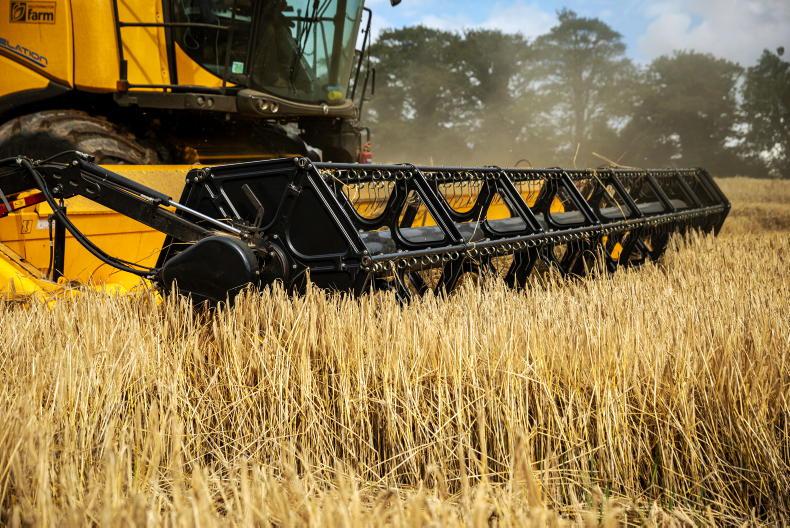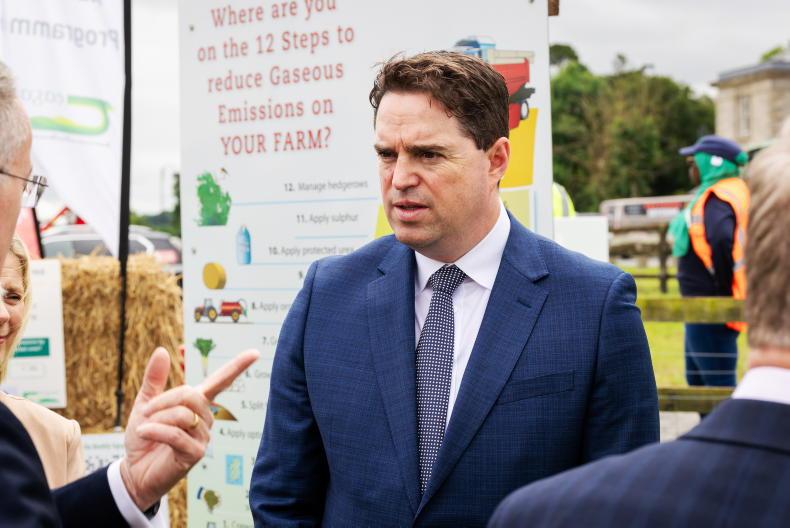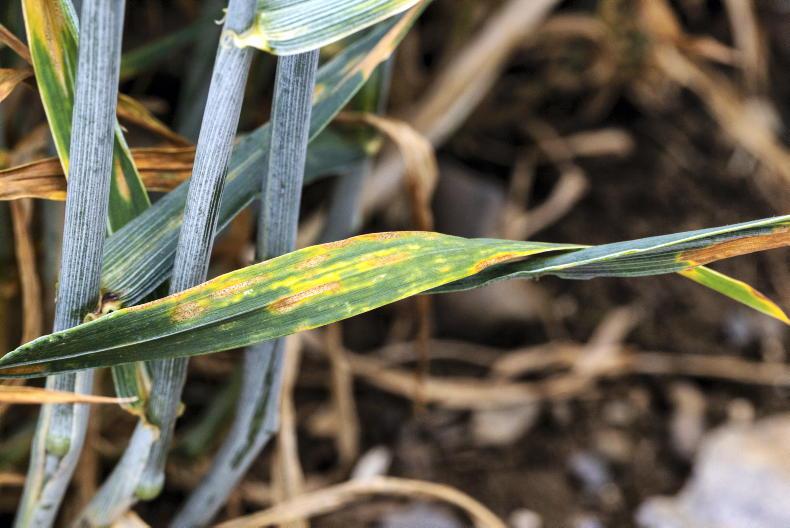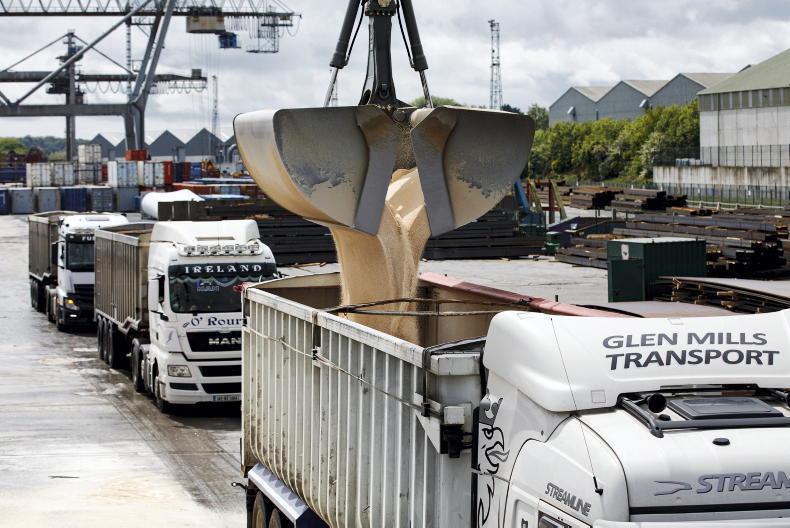In March 2023, Minister for Agriculture Charlie McConalogue announced the establishment of the Food Vision 2030 tillage group.
In May, it met for the first time and last week the group edited the final report containing 28 actions, which are to support and ultimately increase the area of tillage in this country.
Twenty organisations were represented on the group and were joined by Department of Agriculture officials.
The final draft of the report, which the Irish Farmers Journal has seen, contains a background to the tillage sector in Ireland, an analysis of the sector and the key actions which are to help to increase the area of tillage to 400,000ha.
This is the target set out in the Government’s Climate Action Plan.
The report filters the actions into short- and medium-term.
There are now 28 actions in the final report, up from 25 in the draft report and the number of priority actions has moved from 14 to seven, bringing more of a focus on funding.
Considering the tillage area is forecast to decline by at least 20,000ha this year, these actions need to be implemented and investigated immediately.
Some, like extending TAMS items for tillage, accelerating capital allowances and a sustainability scheme could be implemented relatively quickly.
Priority actions
1 Introduce a tillage expansion and sustainability scheme: this scheme would replace the Tillage Incentive Scheme (TIS), which was not available to new entrants in 2024. There is no tillage incentive or support scheme available to farmers in 2024.
The new scheme is to provide longer-term support than the TIS did and will have an environmental focus that improves the sustainability of the sector.
2 Immediate financial package: in recognition of the current significant challenges and to prevent a loss in tillage area, an immediate financial package must be put in place to support growers for the 2024 growing season.
3 Examine existing supports for tillage farmers: this action says that the budget for the Straw Incorporation Scheme needs to be optimised, taking into account the 2030 target to incorporate 55,000ha of cereal straw.
It is aimed at balancing the ambition for soil health benefits with demand for straw from the livestock and mushroom sectors.
The report suggests extending protein supports beyond the current CAP Strategic Plan, extending the range of investments under the Tillage Capital Investment Scheme in TAMS and says there is a need to examine the impact of support measures on the evolving economic viability of the sector.
4 Industry-led initiatives: develop industry-led initiatives that support the economic and environmental sustainability of tillage growers.
By taking sustainability actions on farms growers should be rewarded from the added value derived from the sustainability actions.
5 Deals between livestock and tillage farmers: facilitate and encourage the exchange of organic manure between livestock and tillage farmers.
The group suggests that the Agriculture Water Quality Working Group should consider the issues and develop proposals to facilitate an increase in the transfer of organic manures from livestock to tillage farms.
6 Irish grain: drive the preferential use of Irish feed grain and protein and exploit opportunities for value-added Irish feed.
This action suggests that all relevant independent research be published on the nutritional and sustainability value of Irish feed ingredients across the feed industry, to public and private advisory services, to farmers and meat and dairy processors.
It says recent work by Teagasc on establishing and documenting the lifecycle assessment of Irish tillage crops using methodology that is accepted internationally should be built on, including infrastructure to collect data from farms.
AgNav should also be developed to show the sustainability benefits of using Irish grown feed.
Bord Bia and the IGA need to work together on auditing and ultimately helping to market Irish crops.

Considering the tillage area is forecast to decline by at least 20,000ha this year, these actions need to be implemented and investigated immediately. \ Philip Doyle
7 Ensure the sustainable and safe use of industrial sludges and biobased fertilisers to agricultural land: the Department of Agriculture to engage with the EPA to the review of the management and oversight of sludges being applied to land. Where necessary, supports should be put in place to facilitate required changes arising from that review.
Ensure the tillage sector is represented in discussions on the biosolids quality assurance scheme being developed by Uisce Éireann.
8 Research and early product development: two actions focus on continuing support for research and early-product development aimed at increasing the use of Irish-grown crops in the drinks and food sectors. These actions focus on strengthening industry and grower links and include exploring capital support for crop processing facilities.
9 Align sustainability scheme with Origin Green: Bord Bia and the Irish Grain Assurance Scheme to engage on the development of a sustainable quality assurance scheme aligned with Origin Green.
10 Green taxation: explore innovative “green taxation” measures to support the low emission tillage sector.
This measure asks the Government to consider specific green taxation measures aimed at supporting tillage farms which have low greenhouse gas emissions.
The suggestions include additional incentives for leasing of land for tillage, including young tillage farmers; tax relief and accelerated capital allowances for ‘green climate -friendly’ tillage farm investments.
11 Marketing: continue supports for the marketing of Irish drink and plant-based food products.
12 Oilseed rape processing: commission research on the potential for an oilseed rape processing industry in Ireland.
13 Integrated pest management: continue to develop integrated pest management (IPM) approaches and support their adoption at farm level.

The suggestions include additional incentives for leasing of land for tillage. \ Philip Doyle
14 Risk management: promote existing risk management tools and examine opportunities for an Irish model of crop insurance.
The report states a need to increase the awareness and farmers’ participation in forward selling to manage price risk.
Another suggestion was to begin discussions with relevant stakeholders on developing a central online grain marketing hub for efficiently matching smaller grain sellers with larger buyers.
15 Nitrates losses: support the sector in minimising the loss of nitrates from arable land.
It says that industry-led sustainability schemes should support farmers engaging in additional voluntary practices to improve water quality and, where appropriate, farmers in high-risk catchments should be given priority access.
16 Environmental footprint: continue supports to improve the environmental footprint of tillage farms.
This action is to focus on supports to help to improve water quality, reduce greenhouse gas emissions and improve biodiversity.
Other actions in the report
Consider the impact of solar farm development on availability of high-grade land suitable for tillage under the second phase of the Land Use Review.Explore opportunities for developing a milling wheat industry.Promote tillage as a career choice for students.Ensure the sustainable and safe use of industrial sludges to agricultural land. Provide adequate advisory support services to Irish growers to improve production efficiency and environmental sustainability.Ensure the highest quality seed of new and improved varieties are available to Irish farmers.Exploit opportunities for improved crop varieties through new breeding techniques.Adopt measures to control and prevent the spread of grass weeds.Provide greater recognition and support for agricultural contractors recognising the important services they provide to the tillage sector.Exploit opportunities for the tillage sector from anaerobic digestion.Exploit opportunities for growing the organic tillage sector.Increase participation of tillage farmers in producer organisations.Who was represented on the group?
Tillage Industry Ireland (TII) representing the Animal and Plant Health Association, the Irish Seed Trade Association, the Irish Fertiliser Manufacturers and Blenders’ Association, the Federation of Agricultural Retail Merchants, the Irish Tillage Consultants Association (ITCA).ACORN Independent Merchants.Irish Grain and Feed Association.Irish Grain Assurance Scheme.Tirlán.Dairygold.Food Drink Ireland.Farm and Forestry Contractors in Ireland.Irish Creamery and Milk Suppliers Association.IFA.ICSA.Macra.Irish Grain Growers Group.Teagasc.Bord Bia.UCD.Department of Agriculture, Food and the Marine chief inspector, deputy chief inspector, head of crops policy, evaluation and certification division, Department secretariat.
In March 2023, Minister for Agriculture Charlie McConalogue announced the establishment of the Food Vision 2030 tillage group.
In May, it met for the first time and last week the group edited the final report containing 28 actions, which are to support and ultimately increase the area of tillage in this country.
Twenty organisations were represented on the group and were joined by Department of Agriculture officials.
The final draft of the report, which the Irish Farmers Journal has seen, contains a background to the tillage sector in Ireland, an analysis of the sector and the key actions which are to help to increase the area of tillage to 400,000ha.
This is the target set out in the Government’s Climate Action Plan.
The report filters the actions into short- and medium-term.
There are now 28 actions in the final report, up from 25 in the draft report and the number of priority actions has moved from 14 to seven, bringing more of a focus on funding.
Considering the tillage area is forecast to decline by at least 20,000ha this year, these actions need to be implemented and investigated immediately.
Some, like extending TAMS items for tillage, accelerating capital allowances and a sustainability scheme could be implemented relatively quickly.
Priority actions
1 Introduce a tillage expansion and sustainability scheme: this scheme would replace the Tillage Incentive Scheme (TIS), which was not available to new entrants in 2024. There is no tillage incentive or support scheme available to farmers in 2024.
The new scheme is to provide longer-term support than the TIS did and will have an environmental focus that improves the sustainability of the sector.
2 Immediate financial package: in recognition of the current significant challenges and to prevent a loss in tillage area, an immediate financial package must be put in place to support growers for the 2024 growing season.
3 Examine existing supports for tillage farmers: this action says that the budget for the Straw Incorporation Scheme needs to be optimised, taking into account the 2030 target to incorporate 55,000ha of cereal straw.
It is aimed at balancing the ambition for soil health benefits with demand for straw from the livestock and mushroom sectors.
The report suggests extending protein supports beyond the current CAP Strategic Plan, extending the range of investments under the Tillage Capital Investment Scheme in TAMS and says there is a need to examine the impact of support measures on the evolving economic viability of the sector.
4 Industry-led initiatives: develop industry-led initiatives that support the economic and environmental sustainability of tillage growers.
By taking sustainability actions on farms growers should be rewarded from the added value derived from the sustainability actions.
5 Deals between livestock and tillage farmers: facilitate and encourage the exchange of organic manure between livestock and tillage farmers.
The group suggests that the Agriculture Water Quality Working Group should consider the issues and develop proposals to facilitate an increase in the transfer of organic manures from livestock to tillage farms.
6 Irish grain: drive the preferential use of Irish feed grain and protein and exploit opportunities for value-added Irish feed.
This action suggests that all relevant independent research be published on the nutritional and sustainability value of Irish feed ingredients across the feed industry, to public and private advisory services, to farmers and meat and dairy processors.
It says recent work by Teagasc on establishing and documenting the lifecycle assessment of Irish tillage crops using methodology that is accepted internationally should be built on, including infrastructure to collect data from farms.
AgNav should also be developed to show the sustainability benefits of using Irish grown feed.
Bord Bia and the IGA need to work together on auditing and ultimately helping to market Irish crops.

Considering the tillage area is forecast to decline by at least 20,000ha this year, these actions need to be implemented and investigated immediately. \ Philip Doyle
7 Ensure the sustainable and safe use of industrial sludges and biobased fertilisers to agricultural land: the Department of Agriculture to engage with the EPA to the review of the management and oversight of sludges being applied to land. Where necessary, supports should be put in place to facilitate required changes arising from that review.
Ensure the tillage sector is represented in discussions on the biosolids quality assurance scheme being developed by Uisce Éireann.
8 Research and early product development: two actions focus on continuing support for research and early-product development aimed at increasing the use of Irish-grown crops in the drinks and food sectors. These actions focus on strengthening industry and grower links and include exploring capital support for crop processing facilities.
9 Align sustainability scheme with Origin Green: Bord Bia and the Irish Grain Assurance Scheme to engage on the development of a sustainable quality assurance scheme aligned with Origin Green.
10 Green taxation: explore innovative “green taxation” measures to support the low emission tillage sector.
This measure asks the Government to consider specific green taxation measures aimed at supporting tillage farms which have low greenhouse gas emissions.
The suggestions include additional incentives for leasing of land for tillage, including young tillage farmers; tax relief and accelerated capital allowances for ‘green climate -friendly’ tillage farm investments.
11 Marketing: continue supports for the marketing of Irish drink and plant-based food products.
12 Oilseed rape processing: commission research on the potential for an oilseed rape processing industry in Ireland.
13 Integrated pest management: continue to develop integrated pest management (IPM) approaches and support their adoption at farm level.

The suggestions include additional incentives for leasing of land for tillage. \ Philip Doyle
14 Risk management: promote existing risk management tools and examine opportunities for an Irish model of crop insurance.
The report states a need to increase the awareness and farmers’ participation in forward selling to manage price risk.
Another suggestion was to begin discussions with relevant stakeholders on developing a central online grain marketing hub for efficiently matching smaller grain sellers with larger buyers.
15 Nitrates losses: support the sector in minimising the loss of nitrates from arable land.
It says that industry-led sustainability schemes should support farmers engaging in additional voluntary practices to improve water quality and, where appropriate, farmers in high-risk catchments should be given priority access.
16 Environmental footprint: continue supports to improve the environmental footprint of tillage farms.
This action is to focus on supports to help to improve water quality, reduce greenhouse gas emissions and improve biodiversity.
Other actions in the report
Consider the impact of solar farm development on availability of high-grade land suitable for tillage under the second phase of the Land Use Review.Explore opportunities for developing a milling wheat industry.Promote tillage as a career choice for students.Ensure the sustainable and safe use of industrial sludges to agricultural land. Provide adequate advisory support services to Irish growers to improve production efficiency and environmental sustainability.Ensure the highest quality seed of new and improved varieties are available to Irish farmers.Exploit opportunities for improved crop varieties through new breeding techniques.Adopt measures to control and prevent the spread of grass weeds.Provide greater recognition and support for agricultural contractors recognising the important services they provide to the tillage sector.Exploit opportunities for the tillage sector from anaerobic digestion.Exploit opportunities for growing the organic tillage sector.Increase participation of tillage farmers in producer organisations.Who was represented on the group?
Tillage Industry Ireland (TII) representing the Animal and Plant Health Association, the Irish Seed Trade Association, the Irish Fertiliser Manufacturers and Blenders’ Association, the Federation of Agricultural Retail Merchants, the Irish Tillage Consultants Association (ITCA).ACORN Independent Merchants.Irish Grain and Feed Association.Irish Grain Assurance Scheme.Tirlán.Dairygold.Food Drink Ireland.Farm and Forestry Contractors in Ireland.Irish Creamery and Milk Suppliers Association.IFA.ICSA.Macra.Irish Grain Growers Group.Teagasc.Bord Bia.UCD.Department of Agriculture, Food and the Marine chief inspector, deputy chief inspector, head of crops policy, evaluation and certification division, Department secretariat. 











SHARING OPTIONS